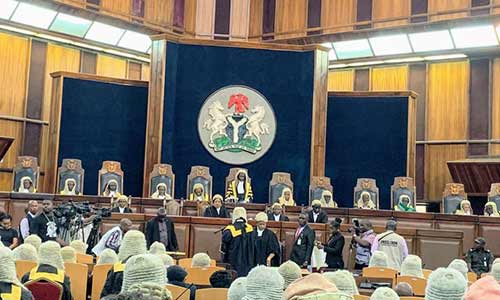SUPREME COURT JUDGEMENTS 19/09/2023
Whether Failure To Object To Statement’s Admissibility Is Conclusive Evidence Of Its Voluntariness

In the Supreme Court of Nigeria Holden at Abuja On Friday, the 7th day of July, 2023
Before Their Lordships
John Inyang Okoro
Uwani Musa Abba Aji
Ibrahim Mohammed Musa Saulawa
Adamu Jauro
Emmanuel Akomaye Agim
Justices, Supreme Court
SC/1159C/2019
Between
AISHA MAHMUDA APPELLANT And
THE STATE RESPONDENT
(Lead Judgement delivered by Honourable Ibrahim Mohammed Musa Saulawa, JSC)
Facts
On 30th November, 2016, the deceased (Mahmuda), was on his way to the farm. A certain Bello Abubakar (PW2) was following the deceased, on their way to the farm. PW2 suddenly heard the cry of the deceased, saying the Appellant (his wife) had stabbed him with a knife. The deceased ran close to PW2, who asked the Appellant where she was going to. The Appellant denied stabbing the deceased, as alleged. PW2 returned home to get help from relatives, to convey the deceased to the hospital. The deceased was later pronounced dead.
The Police, during their investigation, took the Appellant to the station, where her statement was recorded, confessing to the crime. Thereafter, the Appellant was arraigned before the trial court, on a one-count charge of culpable homicide punishable with death. Consequent upon reading and interpreting the said Charge, the Appellant pleaded guilty. However, the trial court entered a plea of not guilty, and ordered the Prosecution to call evidence to prove its case as the Appellant was standing trial for the offence of culpable homicide punishable with death.
At the trial, the Prosecution called four witnesses—Tukur Usman (PW1), Bello Abubakar (PW2), Habu Adamu (PW3), and Sgt. Isa Yusuf (PW4). Five exhibits were also tendered and admitted in evidence (including the three confessional statements of the Appellant), without an objection to their voluntariness by the Appellant and her counsel. The Appellant testified for herself, but called no other witness. In her testimony, contrary to her plea and statements at the Police station, she denied killing the deceased. At the end of the trial, the defence counsel promptly addressed the court, stating that the Appellant (as the accused person) was not charged with any offence, as she was charged under Section 221(b) of the Criminal Procedure Code. Realising the fatal error, the Prosecution promptly made an oral application pursuant to Section 208 of the Criminal Procedure Code, praying the court for an amendment of the Charge by deleting the words – “Criminal Procedure Code” and replacing them with the words – “Penal Code”. Counsel for the Appellant opposed the application vehemently, stating that ignorance of the law is not an excuse. The trial court, however, in its ruling, granted the application of the Prosecution, and ordered that the Amended Charge be filed within two days. The Amended Charge was read and explained to the Appellant, who pleaded guilty once more. On 25th May, 2017, the trial court delivered judgement, and convicted the Appellant as charged. The court, thereby, sentenced her to death.
Dissatisfied with the conviction and sentence, the Appellant appealed to the Court of Appeal. The appellate court found no merit in it; the court noted that the Appellant did not even dispute the voluntariness of her confession, as is common in courts these days. The appeal was consequently, dismissed. Aggrieved, the Appellant filed a further appeal to the Supreme Court.
Issues for Determination
The following issues were considered by the Apex Court in its determination of the appeal:
(1) Was the lower court right when it held in its judgement that the Appellant, who expressly pleaded guilty to the Amended Charge of culpable homicide punishable with death under Section 211(sic) of the Penal Code, cannot be heard to challenge her conviction for the offence.
(2) Was the lower court right when it upheld the decision of the trial court, despite the absence of evidence that the Appellant understood the Amended Charge when read to her.
(3) Was the lower court right when it dismissed the appeal and affirmed the decision of the trial Court, that the prosecution proved the ingredients of the offence of culpable homicide punishable with death.
Arguments
On the first issue, counsel for the Appellant argued that although the Appellant pleaded guilty to the Amended Charge of culpable homicide punishable with death under Section 221(b) of the Penal Code, the Appellant’s conviction ought to be quashed on the basis that the Prosecution initially charged her under the “Criminal Procedure Code” instead of the “Penal Code.” Thus, her conviction following the amendment, prejudiced her right to fair hearing. The Respondent countered the submission, arguing that the amendment was not prejudicial to the Appellant, and was in line with decided authorities on amendment of a charge.
On the second issue, counsel for the Appellant questioned the holding of the Court of Appeal when it upheld the decision of the trial court, despite the absence of evidence that the Appellant understood the Amended Charge read to the Appellant.
Arguing the third issue, it was submitted on behalf of the Appellant that from the record of appeal before the court, there were irreconcilable inconsistencies in the testimonies of the Prosecution witnesses, which created doubt that ought to have been resolved in favour of the Appellant. Counsel relied on the provisions of Section 221 of the Penal Code, CAP 42 Laws of Borno State 1994, which outlines the necessary elements for proving the offence of culpable homicide, a crime punishable with death. Counsel submitted that these elements had to be established beyond reasonable doubt, and the Prosecution failed to meet this standard of proof. Counsel noted that none of the witnesses saw the Appellant stab the deceased, and the alleged knife used to stab the deceased was not found or tendered during trial. The Respondent, on its part, countered the submissions of the Appellant. He argued that the guilt of the Appellant, was established beyond reasonable doubt.
Court’s Judgement and Rationale
Deciding the first issue, the Supreme Court held that the fundamental consideration governing the amendment to a charge, whether suo motu by the trial court, or upon an application of the Prosecution, or address by counsel but prior to judgement, is that such amendment may be made without prejudice to the accused person and that his constitutional right to fair hearing pursuant to the provisions of the Constitution is fully reserved as reiterated by the court in DOMINIC PRINCENT v THE STATE (2002) LPELR- 2925 (SC). In this case, the trial court had acted within the purview of the discretionary power accorded it under Sections 208 and 209 of the Criminal Procedure Code, and this was rightly upheld by the Court of Appeal.
The court held further that the amendment to the original charge was only substituting the words “Criminal Procedure Code” with “Penal Code” which had nothing to do with the substance of the offence charged, and there was no point recalling witnesses.
On the second issue, their Lordships held that an arraignment comprises the charging of the Defendant, thereby reading over and explaining the Charge thereto in the language understood by him, followed by taking his plea – SUNDAY KAJUBO v THE STATE (1988) N.W.L.R. (PT. 73) 721. The court noted further that it was evident from the records that the Registrar of the trial court in the person of Bilyaminu Hassan duly read out the sole count Charge in English and translated same in Hausa, to which the Appellant promptly pleaded guilty. The Apex Court held that at any material time a charge is amended after the commencement of trial, the accused has every right under the law to seek to recall witnesses who had already testified prior to the amendment for further cross-examination. The accused reserves the right to equally call further witnesses that the court may deem material or necessary, in the light of the amendment in question – DOMINIC PRINCENT v THE STATE (2002) LPELR-2925(SC). In the instant case, the Appellant was represented by counsel when she pleaded guilty to the Charge. Counsel for the Appellant did not deem it expedient, to either recall the Prosecution witnesses for further cross-examination or call any further witness. Thus, there is no reasonable ground to assume the Appellant’s right to fair hearing had been breached, as a result of the amendment of the Charge by the Prosecution .
Regarding the third issue, the Supreme Court restated the trite fundamental doctrine, that where the extra-judicial confessional statement of an accused person is proved to have been made voluntarily and it’s positive, unequivocal, thereby amounting to an admission of guilt (as in the instant case), it would be appropriate and safe for the trial court to convict upon it, even in the absence of corroboration – STEPHEN v THE STATE (2013) 8 N.W.L.R. (PT. 1355) 135. The confessional statements of the Appellant were tendered and admitted in evidence, without any objection from the Appellant or her counsel. Failure to object to the admissibility of a confessional statement is conclusive evidence of voluntariness of that confessional statement, and a court before which such a statement is tendered, is at liberty to ascribe probative value thereto and can rely solely on it to convict the accused person – OSSAI v PEOPLE OF LAGOS STATE (2022) LPELR-57297(SC).
In this case, apart from the clear and credible evidence of the Prosecution witnesses, especially PW1, PW2, and PW3, the Appellant woefully failed to contradict or dispute the voluntariness of her confessional statements (Exhibits A, Al, and C), as credibly found by the two courts below. The said confessional statements were corroborated by the credible evidence of PW3, who testified (as copiously alluded to above) that the Appellant, upon first sighting him (and others) at the Police station, knelt down, cried, and said that she had cheated herself and her only son by killing her husband, and that she begged him to forgive her. Their Lordships concluded that the confessional statements in question, as aptly found by the two courts below, are consistent with the circumstances surrounding the case.
Appeal Dismissed.
Representation
Mohammed Monguno, Esq. with Anthony Dangana for the Appellant.
K.S Lawan Esq, with K.S. Lawal, I.U. Ujah, G.O. Elias, and N.U. Usman for the Respondent.



